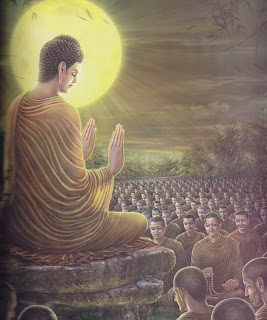Makha Bucha Day
 |
| The Buddha showed The Ovandapatimokkha to 1,250 Arhantas. |
Makha Bucha (or Magha
Puja) is an important Buddhist festival celebrated on the full-moon day of
the third lunar month, usually falls in February or March, which known in the
Buddhist Pali language as ‘Makha’. The ‘Bucha’, also a Pali word,
means ‘to venerate’ or ‘to honor’. Therefore, Makha Bucha Day is
for the veneration of Buddha and his teachings on the full-moon day of the
third lunar month and an occasion when Buddhists tend to go to the temple to
perform merit-making activities.
Makha Bucha Day marks the 4 auspicious occasions, which happened on nine months, more than 2,500 years ago, after Enlightenment of the Buddha who showed ‘The Ovandapatimokkha’ at the largest assemble of monks in Buddhist, at Veluvana Bamboo Grove, near Rajgir in Northern India. The spiritual aims of the day are: not to commit any kind of sins; do only good; purify one’s mind.
 |
| Listening to Dhamma |
The 4 marvellous events occurred:
- There were 1,250 Sangha followers, that came to see the Buddha that evening without any schedule or appointment at Veluvana (Temple) Bamboo Grove, in Rajgir, Magadtha territory in ancient times.
- All of the Sanghas were ‘Arhantas’, the Enlightened One, and all of them were ordained by the Buddha himself.
- The Buddha gave those Arhantas the principles of the Buddhism, called ‘The Ovandapatimokkha’. Those principles are:
- To cast from all evil
- To cultivate good
- To purify one’s own mind
- It was the full moon day which was the same day of Makha Puranam Ditthi Day. Thus, there is another name called ‘Caturangasannipata’ which means the Great Assembly of Disciples marked by the union of fourfold factor.
 |
| Tuk Bard |
Activities to be observed on Makha Bucha Day
- ‘Tuk Bard’ (ตักบาตร): Offering food to the monks and novices (in the Alm Bowl).
- ‘Wien Tien’ (เวียนเทียน): Attending the Candle Light Procession around the Uposatha Hall in the evening full-moon day with holding flowers, incense and a lighted candle. The monks and congregation members circumambulate clockwise three times around the Uposatha Hall – once for each of the Three Jewels – The Buddha, The Dharma and The Sangha.
- ‘Tum Boon’ (ทำบุญ): Making merit by going to temples for special observances, making merit, listening to Dhamma preaching, giving some donations or join in the other Buddhist activities.
- ‘Rub Sil’(รับศีล): Keeping the Five Precepts, Practice of renunciation: Observe the Eight Precepts of meditation and mental discipline, stay in the temple, wearing white robes, for a number of days.
 |
| Wien Tien |
References:
- Dhammathai, MAKHA BUCHA DAY , from http://www.dhammathai.org: http://www.dhammathai.org/e/day/maka_eng.php
- Wikipedia, Magha Puja, from http://en.wikipedia.org: http://en.wikipedia.org/wiki/Magha_Puja
- Royal Thai Consulate General Vancouver, Makha Bucha Day, from http://www.thaicongenvancouver.org: http://www.thaicongenvancouver.org/makhabucha.htm
- วิกิพีเดีย, วันมาฆบูชา, from http://th.wikipedia.org: http://th.wikipedia.org/wiki/วันมาฆบูชา
_______________________________________________________________________________
Vocabulary
lunar month (n.) = ปฎิทินจันทรคติ
Pali language (n.) = ภาษาบาลี
venerate (v.) = เคารพ, นับถือ, บูชา syn. honor
occasion (n.) = โอกาส
tend (v.) = นบน้อม(ใจ)
perform (v.) = ปฏิบัติ
merit (n.) = บุญ, ความดี
merit-making activities (n) = การทำบุญต่าง ๆ
mark (v.) = บันทึก
auspicious (adj.) = เป็นมงคล, ฤกษ์
Enlightenment (n.) = ตรัสรู้
The Ovandapatimokka = โอวาทปาฏิโมกข์
assemble (v.) = ประชุม, รวมกัน
Veluvana Bamboo Grove = ลานไผ่เวฬุวัน (วัดเวฬุวัน)
Rajgir = ราชคฤห์
spiritual (adj.) = เกี่ยวกับจิตวิญญาณ
aim (n.) = เป้าหมาย
commit (v.) = ก่อ, ทำ
sin (n.) = บาป
purify (n.) = ทำให้บริสุทธิ์
marvellous (adj.) = มหัศจรรย์
event (n.) = เหตุการณ์
occur (v.) = ปรากฏ, เกิดขึ้น
Sangha (n.) = พระสงฆ์
without any schedule appointment = ปราศจากการนัดหมายใดๆ
Magadtha territory = แคว้นมคธ
ancient (adj.) = โบราณ
Arhanta = อรหันต์
ordain = บรรพชา
principle (n.) = หลักปฏิบัติ
cast (v.) = ละทิ้ง
evil (n.) = ความชั่ว
cultivate (v.) = อุทิศตัวให้กับ ..
thus (adv.) = ดังนั้น
Caturangasannipat = จาตุรงคสันนิบาต
union (n.) = สหภาพ, การรวมเข้าด้วยกัน
fourfold (adj.) ประกอบด้วย 4 ส่วน
fourfold factor = องค์ประกอบ 4
monk and novice = พระ และ เณร
Alm Bowl (n.) = บาตรพระ
attending (n.) = การเข้าร่วม
Uposatha (hall) = อุโบสถ
holding (n.) = ถือ
incense (n.) = ธูป
lighted candle (n.) = เทียน(ที่จุดแล้ว)
congregation members (n.) = กลุ่มผู้เข้าร่วมพิธีทางศาสนา
circumambulate (v.) = เดินรอบ
clockwise (n.) = วนตามเข็มนาฬิกา
Three Jewels = พระรัตนตรัย
make merit (v.) = ทำบุญ
observance (n.) = การประกอบพิธีกรรม
preach (v.) = เทศน์, แสดงธรรม
give donation = บริจาคทาน
Five Precepts = ศีล 5
renunciation (n.) = การละเว้น
meditation (n.) = การปฏิบัติสมาธิ
mental discipline = การฝึกอบรมจิตใจและอารมณ์
robes (n.) = เสื้อคลุมยาว
ความคิดเห็น
แสดงความคิดเห็น